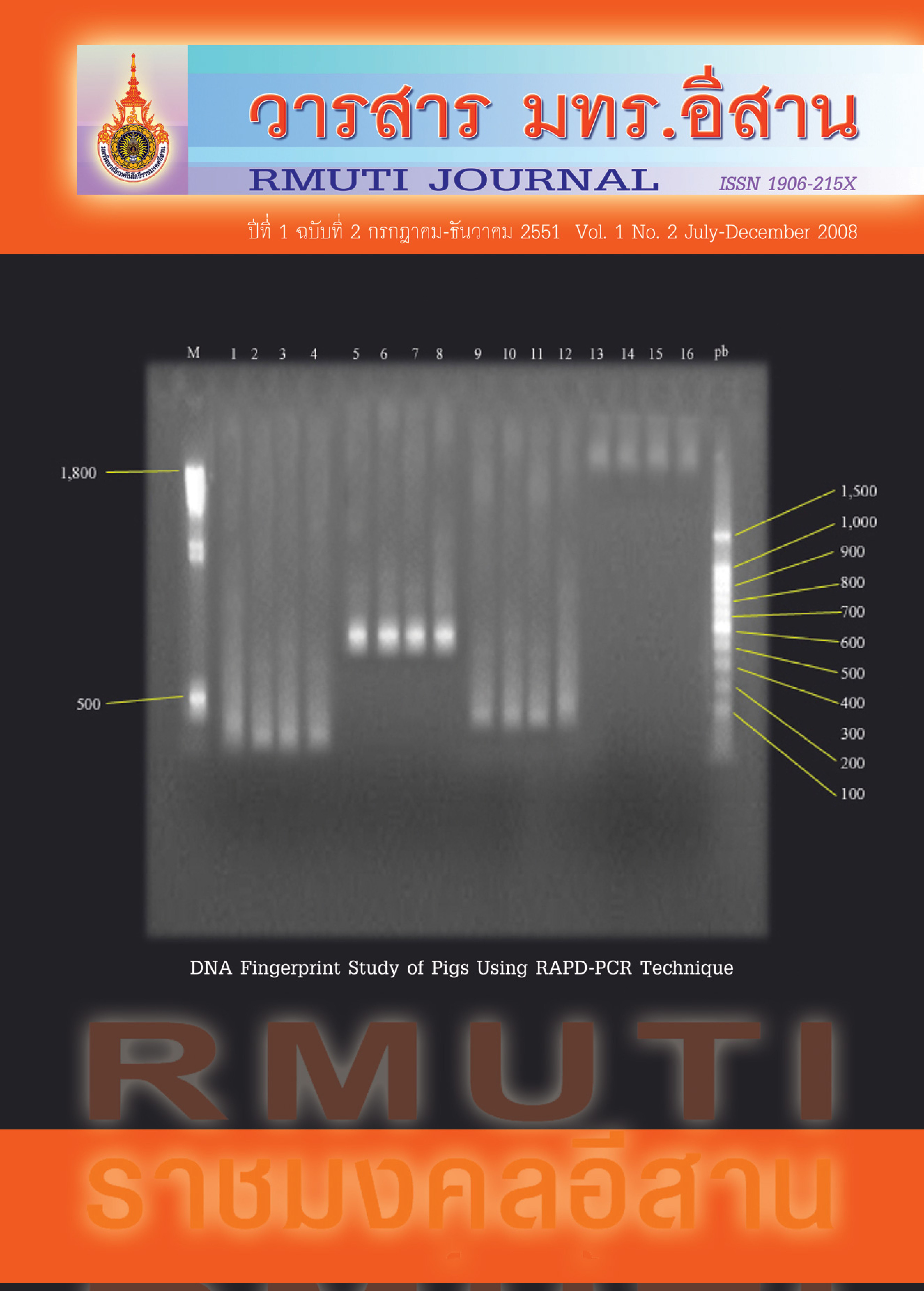การ,จัดการที่ดินทำกิน ที่มืผลกระทบต่อสิงแวดล้อมของครัวเรือน ชนเผ่าลาหู่ อำเภอเรั๊!ยงดาว จังหวัดเชียงใหม่ Effects of Lahu’s Agricultural Land Management on Environments Chiang-Dao District, Chiang Mai Province
Main Article Content
Abstract
บทคัดย่อ
การวิจัยครั้งนี้มีวัตถุประสงค์เพื่อศึกษา(1)สภาพการจดการที่ดินทำกินของครัวเรือนชนเผ่าลาหู่(2)ปัจจ้ย ทางสังคม วัฒนธรรม และเศรษฐกิจ มีความสัมพันธ์กบการจัดการที่ดินทำกิน และ (3) ผลกระทบของ ปัจจัยทางสังคม วัฒนธรรม เศรษฐกิจ และการจัดการที่ดินทำกิน ที่มีผลกระทบต่อสิ่งแวดล้อมของ ครัวเรือนซนเผ่าลาหู่ในอำเภอเชียงดาว จังหวัดเชียงใหม่
การวิจัยโดยใช้วิธีการวิจัยเช้งคุณภาพและเช้งปริมาณ การวิจัยเช้งคุณภาพดำเนินการโดยวิธี สัมภาษณ์เจาะลึก กบกลุ่มประชากรที่มีลักษณะพิเศษโดยเฉพาะ และการสนทนากลุ่มกบกลุ่ม ประชากรที่เป็นชนเผ่าลาหู่ทั้ง 14 หมู่บ้านในตำบลเมืองนะ อำเภอเช้ยงดาว จังหวัดเช้ยงใหม่ การวิจัย เช้งปริมาณโดยการใช้แบบสัมภาษณ์แบบมืโครงสร้างกบกลุ่มประชากรชนเผ่าลาหู่ จำนวนที่งสิ้น 394 ราย การวิเคราะห์ข้อมูลด้วยการวิเคราะห์สมการถดถอยพหุแบบเช้งชั้น (hierarchical regression) และ การวิเคราะห์ปัจจัย (factor analysis) ผลของการวิเคราะห์พบว่า (1) ในปัจจุบันชนเผ่าลาหู่ยังคงเป็น นักอนุรักษ์ธรรมชาติ มีการปลูกพืชหมุนเวียน ปลูกพืชเช้งพาณิชย์และคงมีการปลูกข้าวไร่ ข้าวโพด ถั่ว งา เพื่อเก็บไว้บริโภคภายในรอบปีของครัวเรือน (2) ปัจจัยทางด้านสังคม โดยเฉพาะความเช้อต่อ พฤติกรรมผัน0าค่อนข้างสูงโดยมีค่าเฉลี่ย 86.8 ความขัดแย้งยังคงมีอย่กับเจ้าหน้าที่ของภาครัจี และมี
แนวโน้มยอมรับการแทรกแซงจากหน่วยงานของรฐเพื่มขึ้น ปัจจัยทางด้านวัฒนธรรม ความ เช้อของ ครัวเรือน และความเคร่งครัดจารีตประ เพณี ชน เผ่าลาหู่ยังมีความ ผูกพันกับสิ่ง เหนือ ธรรมชาติ จนกลายเป็นประเพณีปฏิบัติอย่างเคร่งครัด โดยมีค่าเฉลี่ย 51.7 ปัจจัยทางด้านเศรษฐกิจ มีการนำ
เทคโนโลยีใหม่ๆ เข้ามาช่วยในการเพิ่มผลผลิตโดยมีค่าเฉลี่ย 5.8 มีรายได้เพิ่มขึ้น มีการกิยีมเงินทุน
จากหน่วยงานของรัจี (3) ผลกระทบของปัจจัยต่างๆ ที่ส่งผลและมีอิทธิพลต่อสิ่งแวดล้อมครัวเรือน ของชนเผ่าลาหู่ ชนเผ่าลาหู่เมือเริ่มมีการปลูกพืชหมุนเวียนและปลูกพืชเ?งพาณิชย์มากขึ้น แต่ยังขาด ความรู้ ความเข้าใจทางด้านเกษตรแผนใหม่ โดยเฉพาะการใช้สารเคมีต่างๆ บนพื้นที่สูง จึงส่งผลและ มีอิทธิพลต่อความมํ่น่คงในริเวิตของครัวเรือน ความปลอดภัยสุขภาพริเวิตในครัวเรือน ความสงบสุขใน ครัวเรือนและความสมานฉันทํไนครัวเรือนของชนเผ่าลาหู่ ตลอดทั้งชนเผ่าอิน ๆ บนพื้นที่สูงมีความ สัมพันธ์อย่างยิ่งก้บคนพื้นราบด้วย
คำสำคัญ: การจัดการที่ดินทำกิน; พืชหมุนเวียน; พืชเชิงพาณิชย์; ผลกระทบต่อสิ่งแวดล้อม
Abstract
The aim of this research is to study (1) the conditions of Lahu’s land pertaining to management of their agricultural land; (2) factors of Lahu’s social state, culture and economy that related to agricultural land management; and (3) the effects of social, cultural, and economic factors on Lahu’s agricultural land management on environments, Chiang-Dao District, Chiang Mai province
This research is both qualitative and quantitative analysis. The qualitative research was conducted through an in-depth interviews with that sector of the population with specific characteristics, and conversations with the population who are Lahu’s in Maung-na sub district. The quantitative research was conducted through structured interviews with the population of 394 Lahu’s in Maung-na sub district, Chiang-Dao district, Chiang Mai province.
The data were analyzed by using hierarchical regression and factor analysis. The findings were as follows.
(1) At present, the Lahu’s are still natural conservationists. They cultivated plants as crop rotation such as cabbage, egg plant cluster, tomato, broccoli, and carrot as well as commercial crops. The cultivation IS still carried out in the growing of rice, peanuts, and sesame seeds for annual household consumption.
(2) In regard to social factors, there is a high level of belief in the leader’s behavior; and that factor averaged 86.8. They still have conflicts with government officers. The Lahu’s tend to exhibit a greater acceptance of interference from government officers. The Lahu’s have then turned to cultivate crop rotation.
In regard to cultural factors, beliefs and the strictness with which the Lahu’s follow their traditions, it was found that Lahu’s beliefs are strongly tied to the supernatural and the belief in ghosts. Ghosts encourage people to follow the path of morality and to do only good deeds. This is something in which they firmly believe and has remained an integral part of their customs down to the present. This factor averaged 51.7 .
In terms of economic factors, the Lahu’s have more education and have introduced new technology with regard to their production. This enables them to generate more income; and this factor averaged 5.8. They have borrowed capital from government agencies.
(3) With regard to the effects of all the above-mentioned factors, as well as the pattern of agricultural land management on their family environment, it was found that the Lahu’s still lack the knowledge and understanding of new agricultural techniques when they begin to cultivate rotating crops, and commercial crops especially with regard to the use of chemical substances in the highlands. This lack of knowledge and understanding affects the stability of the Lahu’s, their security, health, happiness and the peacefulness of their households, as well as other tribes in the highlands and lowlands as well
Keywords: Agricultural Land Management; Crop Rotation; Commercial crops; The effect of environment

